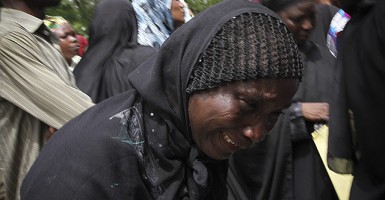Americans have increasingly been pulled into the frightening story of more than 250 schoolgirls in Nigeria who were kidnapped by terrorist group Boko Haram. People around the world have watched and prayed and helped spread awareness of the girls’ plight by using the social media hashtag #BringBackOurGirls. Boko Haram’s leader has offered to trade the girls for the freedom of captured terrorists.
The Foundry asked Charlotte Florance, a Heritage expert who focuses on Africa, to give us some background on who these terrorists are – and what America has known about them for years.
The Foundry: What is Boko Haram? Has it been active for long?
Charlotte Florance: Boko Haram is a Nigerian-based terrorist organization that has received funding and training from al-Qaeda in the Islamic Maghreb, al-Qaeda’s North Africa franchise. It attacked the United Nations headquarters in Abuja, the capital of Nigeria, in 2011. Boko Haram has effectively turned the northern part of Nigeria into a conflict zone, forcing more than a quarter-million Nigerians to flee their homes.
The terrorist group conducts nearly daily indiscriminate attacks against both Muslims and Christians, including car bombs, assassinations, shootings, raids and abductions. More than 8,000 people have died in the past four years as a result of the conflict driven by Boko Haram and Ansaru’s (a Boko Haram breakaway organization) violent activities.
Why is it abducting schoolgirls?
The abduction of the girls from Chibok follows Boko Haram’s desire to ban women’s education and its goal to create a Sharia law state. Since 2013, Boko Haram has claimed it would abduct infidel women and turn them into slaves to sell at the market.
What is the U.S. doing to help?
Last week, the Obama administration announced it was sending a limited number of military personnel (about 30), intelligence and negotiators to assist the Nigerian government in locating and securing the girls. The U.S. is flying surveillance missions across the region to look for the girls, but given the vast and heavily forested terrain, aerial surveillance is unlikely to produce meaningful intelligence. Given the regional ramifications of Boko Haram and the likelihood of the girls being outside Nigeria, U.S. personnel in the immediate term will likely have a limited impact on securing the girls, other than to allow President Obama to say he “did something.”
Hillary Clinton’s State Department refused to give Boko Haram the legal designation of official terrorist organization, which it did not receive from the U.S. government until 2013. What does that mean?
For nearly three years, the U.S. State Department was unwilling to acknowledge the threat and legally define Boko Haram as a terrorist organization, despite its overt and calculated efforts to terrorize Nigeria and its neighbors, including international targets like the U.N. headquarters. Failure to do this denied U.S. authorities one of the key tools required to counter the group’s activities.
The Heritage Foundation had been warning of the group’s threat and calling for its official designation by the State Department since 2009. A timely designation would have given agencies such as the FBI, CIA and the Justice Department the resources to focus on disrupting and countering the terrorist group’s financial support network. If the requests for this designation from Congress and experts had been answered sooner by the State Department, these young girls might have completed their high school exit exams instead of being kidnapped by terrorists.
Why did the U.S. wait so long to designate Boko Haram as terrorists?
Despite the serious implications of instability and violence in Nigeria and the region, the State Department repeatedly deferred to the Nigerian government’s request that the group not be designated so as not to discourage investment in what is now the largest economy in Africa, rather than allowing U.S. national interests – and common sense – to take precedence.
What is America’s relationship with Nigeria?
Nigeria is the United States’ largest trading partner in sub-Saharan Africa. It remains a top producer of oil sold in the United States and is one of the largest contributors of U.N. peacekeepers worldwide. Given the ongoing crisis in Eastern Europe with Russia, a secure and stable oil supply from Nigeria will be a critical component of European energy security.
What should the U.S. do next?
The Obama administration would be naïve to think that once the #BringBackOurGirls story leaves the media limelight, so will the threat of Boko Haram. French President Francois Hollande has offered to hold a regional security summit with Nigeria and surrounding nations to discuss partnership and coordination opportunities going forward. Nigeria has accepted the invitation. The U.S. should support France’s efforts and accept an invitation to the summit.
Before the girls were kidnapped, the U.S. was already training and professionalizing a small number of Nigerian forces, in particular helping to stand up Nigeria’s own “Army Special Operations Command.” These types of training and partnership opportunities that help professionalize the Nigerian security forces should be expanded.
Outside of military and security support, the U.S. should also look at opportunities to help the Nigerian government advance economic freedom, focusing on more inclusive growth and dynamic job creation in northern Nigeria. This would help create greater economic opportunities and build trust with the Nigerian government, undermining Boko Haram’s ability to recruit and act with impunity in the north.
Read the Morning Bell and more en español every day at Heritage Libertad.
Quick Hits:
- Sen. Rand Paul (R-Ky.) and Stephen Moore have some advice for raising middle-class wages – not the minimum wage.
- The House is building a select committee to investigate Benghazi. Sen. Ted Cruz (R-Fla.) says the Senate shouldn’t be left out.
- These Christian brothers had their show dropped by HGTV – and here’s what they’re saying now.
- The president of the U.S. Chamber of Commerce said that if Republicans don’t pass an amnesty bill, maybe they shouldn’t bother running a candidate for president.
- Police officers in Portland, Ore., handcuffed a 9-year-old-girl and took her to the station in a police car. Why?


























